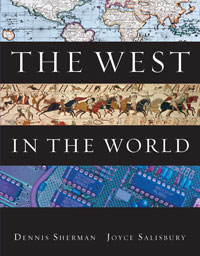
The West in the World, 4th Edition (Sherman)Chapter 16: Overturning the Political and Social OrderChapter SummariesWithin France, preoccupation with Enlightenment ideals and discontent with the status quo infected the country's social orders. When the French third estate moved to gain more rights and political power, it sparked a period of revolution that changed both France and Europe. While the middle class and peasantry benefited most from the initial period of revolution, the French urban populace led the country toward the establishment of a radical republic. French society then suffered through a period of repression known as the Terror. Meanwhile, an ambitious soldier, Napoleon Bonaparte, took advantage of the new opportunities opened by the Revolution and created an empire with himself at the head. The influence of the Revolution and its ideals of "Liberty, Equality, and Fraternity" spread far beyond French borders, as a result of the magnitude of the Revolution and Napoleon's military conquests. The French Revolution left several legacies, of which the most important were the notions that revolution could topple any government and that a charismatic leader could seize power. Both of these ideas would influence future revolutionaries. |  |















